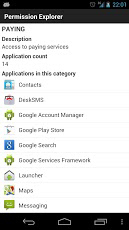The Android smartphone or tablet you carry around with you everywhere collects a wealth of information about your life—where you go, who you communicate with, photos and videos of your family, and how you spend your time (calendar). But you might not realize the degree to which the Android apps you install on your mobile devices give the developers who coded them a window into your activities.
And, sometimes these developers grab information from a mobile device that seems unnecessary. Why, for example, does the app Best Resume Tips (one I recently reviewed for a story) need to access my location? I do not know.
At the same time, it doesn’t really bother me that Evernote shines a light into seemingly every corner of how I’m using my Android phone. After all, the whole point of the app is to help me remember everything I do, so its greedy consumption of the personal information on my phone makes sense. Plus, Evernote is a supremely popular app and I trust the company more than, say, some lone programmer who might work out of his basement and only have his app on three people’s devices.
If the idea of strangers knowing what you’re doing with your mobile device bothers you, there are ways to find out what apps can see and track the permissions you’ve given them (knowingly or not).
Check Android App Permissions
Android makes it dead simple to see what permissions apps have access to on your device. On your smartphone or tablet just go to Settings>>>Apps. There you’ll see a list of all the apps that have some kind of access to your device information. Unfortunately, knowledge is not power, at least where Google is concerned. Unlike iOS, which lets users turn off various app permissions one by one, Android only lets you uninstall the entire app if certain permissions bug you.
Or Try the Permission Explorer App
 There’s an Android app called Permission Explorer (free on Google Play) that’s somewhat helpful. Instead of having to go into each app and figure out what it has permission to do, Permission Explorer shows you how many and which apps have access to certain kinds of permissions that you might be more keen on avoiding. For instance, some apps may have access to services that might cost you money or see what you’re texting or emailing.
There’s an Android app called Permission Explorer (free on Google Play) that’s somewhat helpful. Instead of having to go into each app and figure out what it has permission to do, Permission Explorer shows you how many and which apps have access to certain kinds of permissions that you might be more keen on avoiding. For instance, some apps may have access to services that might cost you money or see what you’re texting or emailing.
Which Permissions You Should Worry About Most
So which permissions should you worry about the most? Following, you'll find the most worrisome types of permissions. But it's tough to say to which permissions to avoid because not only are the tons of permissions developers can employ, but there are often legitimate reasons for a developer to require access to potentially worrisome permissions.
If you’re concerned about any app permission enabled on your device but don’t necessarily want to delete the app, try emailing its developer to ask why the app needs it. To do so, just find the app in the Google Play store and click on Email Developer, which should be at the bottom of the app’s overview description. If you don’t get a satisfactory answer, my advice is to delete the app and find another that works in a similar manner but has better support and management.
Location
Even if you don’t like the idea of people being able to see your location, some apps need that info to work properly. I can think of scads of them that do—Instagram, in case you want to tag a photo you take with a location; Facebook and Twitter for the same reason; Evernote, as I already mentioned; Foursquare, which is completely based on where you are; and many other apps, including some that simply want to provide you with location-based ads. Ads, of course, are what make so many ads free.
Services That Cost You Money
This sounds like a big one, but honestly, lots of apps need to be able to make phone calls or texts, both of which could potentially cost you money, depending on whom they’re going to. Google Voice is an app that I use daily because I can text my husband using my PC’s keyboard without having to tap-tap-tap on my phone. But because there are some aspects of Google Voice that involve incurring fees Google has to disclose it. Treat this more as a heads up that you should look for why the app might make a call or send a text, rather than a certainty that it will.
Read Your Contacts
Many apps use your contact information to let you interact with others. For instance, I use a popular app called Life 360 Family Locator that lets you locate and text message your family members as well as see where sex offenders live according to location. In order for me to text my kids or husband, obviously the app needs their contact information. Google, however, warns that “This permission allows apps to save your contact data, and malicious apps may share contact data without your knowledge.”
About Those Malicious Apps
Bad apps coded by bad people do exist and you certainly don’t want to give them access to your personal data. To avoid doing so, only install apps that have been downloaded by thousands of people and are rated 4 and above. And only download from Google Pay or another respected location, such as the Amazon Appstore.















From Tiffany on January 07, 2013 :: 6:56 pm
Thank you for this! I always wondered what all the permissions mean and which ones I should let an app have
Reply